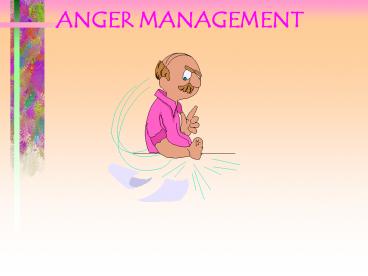ANGER MANAGEMENT - PowerPoint PPT Presentation
1 / 24
Title:
ANGER MANAGEMENT
Description:
ANGER MANAGEMENT WHAT IS ANGER? An emotional state. Varies in intensity A coping mechanism. How you deal with events that threaten the body, self-esteem or values. – PowerPoint PPT presentation
Number of Views:717
Avg rating:3.0/5.0
Title: ANGER MANAGEMENT
1
ANGER MANAGEMENT
2
WHAT IS ANGER?
- An emotional state.
- Varies in intensity
- A coping mechanism.
- How you deal with events that threaten the body,
self-esteem or values. - Related to fear.
- Can be destructive and lead to problems - at
work, in relationships, quality of life. - Feeling mad in response to frustration or injury.
- Distorted thinking.
3
Ancient Medieval Definitions -Madne
ss -Insanity-Those lacking ethics morals
4
CURRENT VIEWS
- Angry people are hostile. (Hostility is a chronic
state of anger. - Hostility is a permanent personality
characteristic. - Hostile people are unhappy.
- Angry people are emotionally insecure.
- Angry people have a low sense of self.
5
EFFECTS OF ANGER
- Anger---gt Rage ---gt Violence
- Does great harm - more than any other emotion.
- Associated with crime, abuse, poor working
conditions, poor health. - Reports from Statistics and Surveys
- Road rage -gt 8,000 deaths, 1 million injuries
6
EFFECTS OF ANGER
- Polls reveal that people indicate that they feel
like killing others. - Crime rate soars rapes, murders, battering,
child abuse, domestic abuse. - 1 in 5 women are raped - 683,000 in 1990 - 30
were less than 11 years of age. - Children between 3-17 years are the most violent.
7
CHARACTERISTICS OF ANGRY PEOPLE
- Hostility - silently or overtly
- Marital problems
- Greater stress in interpersonal aspects of work.
- Uses threat of anger to manipulate others.
- Negative view of work.
- Less open-minded.
- Hostile people are unhappy.
- Report more difficulties at work.
- Less job satisfaction.
8
CHARACTERISTICS OF ANGRY PEOPLE
- Are cynical.
- Have antagonistic interactions.
- Less tolerant.
- Less understanding.
- Less socially responsible.
- Distrustful, resentful.
- Competitive.
- Blame others, put down others and demean others
as a way of seeking revenge. - Influence other people to share their cynicism
pessimism.
9
BEHAVIORAL SIGNS
10
BEHAVIORAL SIGNS
- Chronically angry people frequently create
unfriendly social environments for themselves by
the way they deal with anger. - Verbal antagonism and condescending remarks --gt
fuels antagonism from others. - Assaults physical, rage, slapping, shoving,
using a weapon.
11
BEHAVIORAL SIGNS
- Aggressive overly critical, fault finding,
name-calling, sarcasm, prejudice, cynical humor
and teasing, flashes of temper. - Hurtful malicious gossip, stealing,
trouble-making, revengeful, passively resistant,
interferes with progress. - Rebellious open defiance, indirectly challenging.
12
BEHAVIORAL SIGNS
- Health smokers, drink more alcohol and coffee,
consume more calories. Poor health overall. - Others resentful, jealous, envious,
argumentative, unforgiving, tired and anxious.
13
ANGER KILLS
14
ANGER KILLS
- Thought -gt Brain -gt Lets Get Mad -gt autonomic
nervous system -gt release of hormones chemicals
in blood -gt increases heart -gt increases blood
sugar and pressure -gt increases breathing -gt
impairs senses -gt releases deadly cortisol for
fight or flight -gt drains adrenal glands -gt
stimulates fat cells -gtconverts to cholesterol.
15
ANGER KILLS
- To get angry is to slowly commit suicide.
- Anger releases a slow-acting poison. Is toxic.
Damages immune cells. - Cumulative effect cholesterol buildup which
blocks blood flow to arteries starving heart. - Causes release of chemicals and killer venom.
16
ANGER KILLS
- Decreases production of serotonin which activates
the sympathetic nervous system which speeds up
release of cortisol - killer venom. Decreases
action of parasympathetic nervous system. - Cortisol is potently dangerous - it lasts for 13
hours at the cellular level when released. - Linked to cancer. Causes slow burn.
17
ANGER KILLS
- Suppressed anger is equally as bad --gt
bitterness, depression, high blood pressure,
heart disease, colitis and other illnesses.
18
WAYS TO MANAGE AND EXPRESS ANGER
- Two Rules to Live By
- Dont Sweat the Small Stuff.
- Most Matters are Small Stuff.
19
Learning to Manage Anger Can Be A Life Saver!
- If you are an angry person, an abuser, an
oppressor -- work on changing your habits! - If you are a person impacted by an angry person,
you must alleviate the assaults the angry person
makes to your person and body or eliminate the
angry person from your life! Anger is like
second-hand smoke. It can kill a non-hostile
person too!
20
SOME SUGGESTED STRATEGIES
- Stress Inoculation.
- Flooding or Frustration Training.
- Meditation, Relaxation.
- Assertiveness.
- Be Empathic.
- Learn To Be Fair.
- Learn to Hold Back Anger.
- Stop Using Your Temper To Get Your Way.
- Practice Listening.
- Improve Communication.
21
SUGGESTED STRATEGIES
- Cognitive Restructuring.
- Stop Hostile Fantasies.
- Respect Others.
- Practice Forgiveness.
- Have a Sense of Humor.
22
SOME SPECIAL STRATEGIES
- A TEN-STEP PROGRAM
- RULES FOR EXPRESSING ANGER
- TIME OUT
- COPING WITH YOUR CO-WORKERS OR BOSS
- RETHINK -(RECOGNIZE, EMPATHIZE, THINK, HEAR,
INTEGRATE, NOTICE AND KEEP)
23
9 STRATEGIES FOR CONTROLLING HARMFUL HOSTILITY
- Identify your pet peeves.
- Reason with yourself.
- Stop hostile thoughts, feelings and urges.
- Avoid over stimulation.
- Assert yourself.
- Listen.
- Forgive.
- Pretend today is your last.
- Help yourself and/or others to change.
24
PRACTICE EXERCISES
- Group Activity Anger Workbook
- Group Report Outs
- Questions and Answers
- Thank You For Your Participation!































